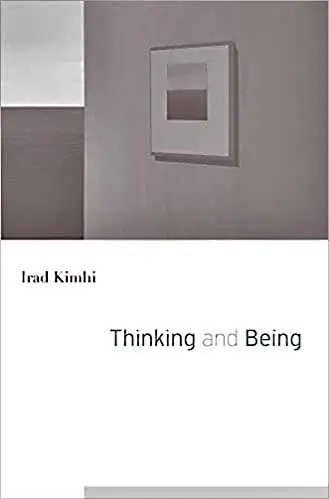Thinking and Being by Irad Kimhi
Page last updated 21 Nov 2020
In some quarters Irad Kimhi has been touted as the next great but overlooked philosopher.
See, for example, Unpublished and Untenured in The New York Times, True or false? in The Times Literary Supplement, or On Irad Kimhi’s Thinking and Being by Steven Methven in The Point Mag.
In the introduction to his book “Thinking and Being”
Irad Kimhi, Thinking and being, Harvard University Press, 2018.
Kimhi sets out his areas of concern, much of which is based on the ideas of Parmenides, and which criticizes some of Frege’s ideas. 
In the introduction Kimhi states:
Put briefly, philosophical logic cannot attain the sort of mutual illumination to which it aspires unless it is able to reveal that there is no logical gap between the premise and the conclusion in each of the following two inferences - from 1 to 2 and from 1* to 2*:
1. He is pale.
2. We who think that he is pale are right. (We think what is true.)
1*. She is not pale.
2*. Those who think that she is pale are wrong. (They think what is false.)
Correctly viewed, such inferences manifest the dependency of the truth or falsity of a judgment on what is or is not the case.
But there isn’t any difficulty here, apart from the imaginary one created by philosophers misreading the situation. One only has to consider that such expressions do not exist in a vacuum; they belong to a language system, the language system of some human or machine, and these language systems need not be identical for all expressions. Consider two cases:
- For one single person
A ,A can state “He is pale” and can imply from that, that becauseA himself/herself thinks “he is pale” thenA can imply “We who think that he is pale are right. (We think what is true.)”. - A person
B is contemplating the utterances of the two other persons, a personC who states, “He is pale” and a personD who states, “We who think that he is pale are right. (We think what is true.)”
To fail to discern the difference between two cases is an elementary error of logic. In case (i) whether the person
There’s no difficulty there. There is only a problem if one disassociates statements 1 and 2 from the language and logic systems to which they can belong. The assertions 1* and 2* can be treated similarly.
Kimhi then talks about some of Wittgenstein’s remarks, referring to:
… puzzles that arise from the use of the veridical verb [“is” means to be true or to be the case] in making seemingly straightforward points about the truth and falsehood of positive and negative judgments. Let us consider two such remarks by way of preparation for considering a third. The first concerns the falsehood of a simple positive judgment:
How can one think what is not the case? If I think King’s College is on fire when it is not on fire, the fact of its being on fire does not exist. Then how can I think it?
The second concerns the truth of a simple negative judgment:
It is the mystery of negation: This is not how things are, and yet we can say how things are not.
Both of these puzzles are concerned with saying or thinking something that is not - that is therefore nothing.
There’s no puzzle here, and no mystery. It is risibly simplistic to question why one should be able to conceive of situations for which there is no corresponding real life situation. The idiocy of this stance is obvious and requires no further comment other than that one could equally well question why one could not conceive of situations for which there is no corresponding real life situation. This is arrant nonsense dressed up as meaningful philosophy.
Kimhi goes on to remark about these “puzzles” that:
The aim of this book is to show that these puzzles pertain to the logical validity of certain inferences - forms of validity which are expressed in what I call the syllogisms of thinking and being. Here are two examples of such syllogisms:
(1)
(2) not-
(3)
(1*)
(2*) not-
(3*)
Again, there is no difficulty here whatsoever, except for the artificially created imaginary difficulty dreamt up by self-absorbed philosophers who fail to see the obvious. There is clearly a crucial difference between the person
The fact is that it is immaterial whether
This simply demonstrates the utter folly of attempting to make a logical analysis of expressions without taking full consideration of the language system that they can logically belong to, and instead concentrating on some sort of notion of the absolute “truth” of the expressions.
It is evident that philosophers have managed to tie themselves into convoluted knots over this issue, an issue that is easily settled by a simple consideration of the language system that an expression belongs to, see also Natural language and reality.


Rationale: Every logical argument must be defined in some language, and every language has limitations. Attempting to construct a logical argument while ignoring how the limitations of language might affect that argument is a bizarre approach. The correct acknowledgment of the interactions of logic and language explains almost all of the paradoxes, and resolves almost all of the contradictions, conundrums, and contentious issues in modern philosophy and mathematics.
Site Mission
Please see the menu for numerous articles of interest. Please leave a comment or send an email if you are interested in the material on this site.
Interested in supporting this site?
You can help by sharing the site with others. You can also donate at where there are full details.
where there are full details.